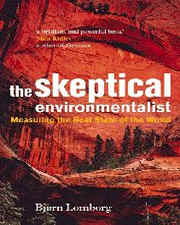![]()
The Socialist Party of Great Britain’s Review of Bjorn
Lomborg’s Book
![]()
Old Hickory

Bjorn Lomborg -- you have to admit it's getting better..."
The reviewer signs off as
‘DG’ and the review is entitled “Sceptical about Doomsday?” He asks
whether capitalism can adapt and whether it even needs to adapt.
In the 1960s the SPGB no more sided with the Greens than did Marx with
Malthus in the nineteenth century. But
in the 1970s they tended to think that if ‘it’ is against capitalism then
that is good enough. It is rather
like the fallacy that “my enemies enemy is my friend” but whether a common
opponent is an ally depends on the particular components of each one’s
creed.
The reviewer realises that the
facts are not all that easy to see on the environment.
However, the Greens, like the SPGB, have a quasi-religious outlook that
disapproves of human beings as they are.
It hopes that they might be better in the future.
It jumps from saying that we can all have more to saying that we will
all be more careful in the new society. The
former idea hardly fits in with the Green outlook. The
anti-economist, Lester Brown, is cited from his book Eco-Economy thus: “our economy is slowly destroying its support
systems, consuming its endowment of natural capital. Demands of the expanding economy, as now structured, are
surpassing the sustainable yield of eco-systems.” This is typical Green bosh and it has been accompanied by
bold predictions since 1965, all of which, like the charge of the Light
Brigade, rode into certain doom.
The Green track record is a list
of predictions that have all been refuted in the event.
We are told that Bjorn Lomborg is a former Greenpeace campaigner.
Julian. Simon’s books which he said he found in second-hand bookshops
converted him to an anti-Green position.
The result is his book The
Skeptical Environmentalist (2001). The
reviewer wonders how such different result as those of Brown and Lomborg could
be reached. His answer is that
they differ on the facts and what should be done about the facts in any case. Lomborg questions the idea that 40 000 species are becoming
extinct each year and that pesticides are a great danger.
The actual reason is that the truth is not manifest and most of us are
ignorant. It is easy for a tyro
to discover things unknown by an expert of many tears standing as the latter
remains largely ignorant despite knowing quite a bit.

Read this and feel good about the future
We are told that Lomborg has been
accused of being selective by the Greens – the same accusation he has made
against them. He is said to
overlook the point the Greens make about species of fish being on the decline
by reporting a bigger global catch. He
does much the same on deforestation. They
are concerned that some trees have only recently been re-grown while Lomborg
thinks that matters little to bio-diversity.
The reviewer feels that Lomborg is selective.
It is held that he does not take the call of wolf today seriously owing
to there being no wolf in the past, but that is thought by the reviewer to be
unwarranted. Logically it is, but
it is not a bad supposition and it is one that most long time observers of the
Greens will tend to assume. We
should still check but we will certainly cease to panic.
Pollution has diminished in the
past fifty years but the reviewer wants to say there is still lots to moan
about there. He feels it is
profit that is to blame but that is not a topic he has thought critically
about. All this has occurred
during a doubling of world population over the last 30 years and with a
resulting expansion of economic activity.
It seems that both Lomborg and Brown overestimate solar and wind power.
There is, of course, lots of potential in capturing more energy from
the sun. It is said that all the
fossil fuels only represent about ten days of sunlight landing on the earth.
However, there is no immediate shortage of oil, and with increasing
usage the stockpiles in terms of years have gone up from 20 years in the 1930s
to 47 years by the 1990s. We are no more likely to run out of oil than the Stone Age
ran out of stones.
The reviewer moans about vested
interests and the fact that most research is in established areas of fossil
fuels and nuclear power. But why
not research where it is likely to pay off?
The reviewer thinks that this is a reason for saying that any future
expansion of renewables will not be a success for capitalism!
Well, as no post-capitalist society is due, capitalism will develop the
renewables if they are to be developed at all.
Some might think that this
doomsday syndrome dates from just the 1960s since when the BBC has been
putting out about ten programmes a week featuring it.
But in fact the Tories were against the “industrial revolution” [as
Toynbee called it in the 1880s] from the beginning. So we do not just have 35 years of shouting wolf but about
200 years of it. We still need to
check but we can be relaxed about that duty.
The reviewer thinks that fossil
fuels are the main cause of global warming but the Greens are a bit fast to
come to this conclusion when their main culprit, carbon dioxide, is still a
trace gas being only from 0.02 to 0.04 of the atmosphere.
Water vapour is clearly a bigger factor as Philip Stott so often says
to the Greens on the media. Climate
change is the norm. Natural
history shows plenty of it prior to life itself and, if anything, life has
made its own nest of the atmosphere as the Gaia hypothesis of James Lovelock
suggests. There is no objective pollution.
One species’ meat is indeed another species’ food, even within the
microbial domain. Microbes are so
polymorphous that perversion is alien to them, and that is about the only
thing that is beyond them. With
the rise of Genetic Engineering, we are fostering their adaptive ability to
use genetic information rather like we use literal information in language and
thought. Microbes usually do not
need to wait fifteen minutes for another generation to adapt as they can do so
by connecting. We can use them to
defend us against attacks from their own domain and to clear up pollution
problems like oil spills.
The reviewer adds the Brown book
to the supposed review of the Lomborg book as he favours this anti-economist.
After all, Marxism functions mainly as a form of anti-economics itself. It is not an extra option to the Tory or Whig choice but
firmly a Tory option and socialism always was the old Tory ideas with a new
name. Brown is for ecology over
economics and this misanthropy is typical of the Green outlook.
They prefer less humanity and more non-human nature.
The reviewer rightly sees that capitalism puts profits above ecology
but seems not to see that this puts humans first.
Instead, he thinks that profit is somehow not production for use, as it
directly uses an economic criterion as to what is going to be useful in the
form of money. He is on Brown’s side but he is so confused, as is Brown
also, that he has no idea of where that puts him.
He entertains the delusion that he is anthrophilic.
But he explicitly joins the “kind vision” of Brown in his quest to
curb humanity greatly. Most of
the suggestions Brown has are hopeless but tend to follow the emotional plague
rule that objective reality does not matter so long as the advocate means
well. The Marxists think
themselves materialists but their whole case amounts to little more than the
old adage that “it is the thought that counts”.
A case in point is the daft idea
that public transport is a good idea when a more wasteful idea is not easy to
find. It means big vehicles
running with few people on them all too often and they also usually run less
economically. Thus, even if these
vehicles were all full up they would hardly match the average car carrying one
person. Maybe taxis are the
solution for public transport but how many Greens have any idea of that fact?
How many thoughtless politicians do?
The reviewer calls Lomborg
simplistic for thinking that the progress made hitherto is an indication that
it will continue, but that hypothesis might be right.
Anyway, it is ahead of the Green propositions based on bigotry and
ignorance that the reviewer is inclined to favour, owing mainly to his own
ill-thought-out Marxist dogma.
That is certainly simplistic and haply way more clearly so.
The reviewer notes that both Lomborg and Brown think that the state
should uses subsidies but in reality there is no reason to think the Green
recommendation have any merit and their track record up till now suggests it
best to be critical towards their folly.
Lomborg ignores nuclear wastes says the reviewer but Beckmann did not
so perhaps he should read The Health
Hazards of NOT Going Nuclear (1976).
The reviewer rejoices in not being convinced by Lomborg that Brown is
wrong but he clearly has not done much thinking on the topic and if he decides
to debate it out then he may well learn something yet.
An extension of private property will ensure that the problems the
Greens go on about will be costed, thus making the polluters pay their way and
bringing economy into line with ecology in a completely free market.
The idea that the price system fosters inconsideration and
irresponsibility is exactly wrong. It
is the major institution of civilisation in every sense of that word.
![]()
Further reading:

Omnipotent Government
Von Mises, Ludwig "Written in 1944, this is a ferocious critique of the rise of the Total State and Total War. "
Abebooks
![]()
The
anti-economist, Lester Brown, is cited from his book Eco-Economy thus: “our
economy is slowly destroying its support systems, consuming its endowment of
natural capital. Demands of the expanding economy, as now structured,
are surpassing the sustainable yield of eco-systems.” This is typical
Green bosh and it has been accompanied by bold predictions since 1965, all of
which, like the charge of the Light Brigade, rode into certain doom.
![]()
![]()
The reviewer moans about vested interests and the fact that most research is
in established areas of fossil fuels and nuclear power. But why not
research where it is likely to pay off? The reviewer thinks that this is
a reason for saying that any future expansion of renewables will not be a
success for capitalism! Well, as no post-capitalist society is due,
capitalism will develop the renewables if they are to be developed at
all.
![]()
![]()
The reviewer calls Lomborg simplistic for thinking that the progress made
hitherto is an indication that it will continue, but that hypothesis might be
right. Anyway, it is ahead of the Green propositions based on bigotry and
ignorance that the reviewer is inclined to favour, owing mainly to his own
ill-thought-out Marxist dogma.
![]()